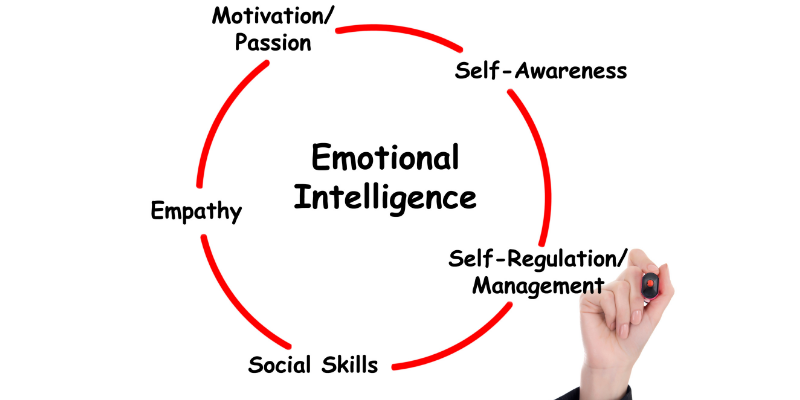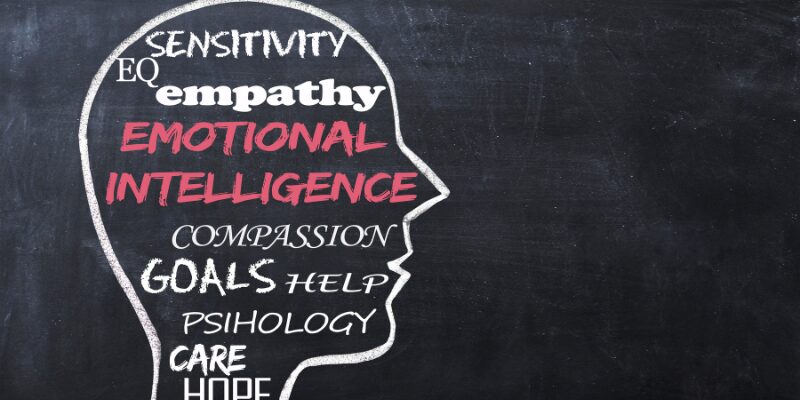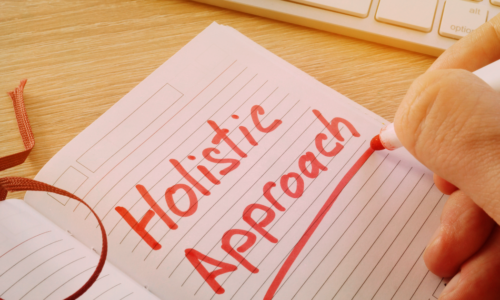
The Key to Improved Mental Health and Relationships with Emotional Intelligence
- January 7, 2024
- Community and Support
- 0 Comments
Have you ever wondered about the key to unlocking improved mental health and nurturing better relationships? The answer might be closer than you think. Emotional intelligence is often underestimated yet powerful.
It plays an important role in navigating the complexities of your mind and connections with others. But what exactly is this key, and how can it transform your well-being?
Step with Mental Map Guide to learn how to know whether you have emotional intelligence and the best strategies to improve your EQ for getting a rich mind and healthy lifestyle.
Table of Contents
What is Emotional Intelligence?
Have you ever noticed someone who stays cool and collected during tight deadlines or gracefully handles awkward family dinners? They get where you’re coming from without you saying much. It is because they might have a particular skill called emotional intelligence (EQ).
What’s intelligence? It’s about learning new stuff and solving problems. Emotional intelligence, often abbreviated as (emotional quotient) EQ or EI, is like you have about understanding yourself and using that insight to navigate the world around you.
Why does it matter? Research shows that having a high EQ comes with some awesome benefits. You’re looking at better mental health, healthy relationships, and more satisfaction. Some people say it’s even more crucial than IQ for success in life.
In simpler terms, having emotional intelligence means using, understanding, and positively managing your emotions. It helps you handle stress, communicate well, empathize, get challenges in positive thinking, and resolve conflicts. Plus, it’s your secret tool for building solid relationships, succeeding in school and work, and reaching your personal and career goals.
What are the Components of Emotional Intelligence?

Let’s see emotional intelligence into five primary elements, each playing an essential role in how you feel, understand, and control emotions:
Self-awareness:
Know yourself. If you’re self-aware, you can manage your behaviors and motives and know how they impact a situation and what is good or bad for it.
Self-regulation:
Keep it cool. If you’re self-regulated, you can manage and control your own emotions, impulses, and reactions. For example, you think before you talk and act depending on circumstances. It also means you can stay composed in stressful situations, refuse to do something on a whim, and handle changes without losing your cool.
Motivation:
Stay driven. In emotional intelligence, motivation is about you have the energy, persistence, and resilience to reach your personal goals. That drive to succeed keeps you going, even when faced with obstacles or setbacks.
Empathy:
Feel with others. You listen to them, feel their story, know what they should talk about to continue the conversation, or realize how to end up in a great way. It’s about tuning in to the emotions of those around you like you can “walk in their mind.”
Social skills:
Connect with others. If you’re good at social skills, you can be aware of other needs, resolve conflicts smoothly, and work well with others. You must think about active listening, eye contact, effective communication, and body language.
What Are the Signs of Emotional Intelligence?

Wondering how to spot emotional intelligence? Look out for these signs:
- Recognizing Feelings: Can you say what others are feeling? That’s a key sign.
- Self-Awareness: What are your strengths and limits? It’s a big part of emotional intelligence.
- Confidence and Self-Acceptance: Think good about yourself and be happy with who you are.
- Learning from Mistakes: Can you move on from Failure? Don’t give up. When you fall down, you think it’s a lesson and learn from it. It is a sign of emotional intelligence.
- Adapting to Change: Being excellent with change, even big or small, shows high emotional intelligence.
- Curiosity About Others: Having a great interest in what makes people tick.
- Empathy: Feeling for other’s stories and showing concern for their feelings.
- Sensitivity: Awareness of how others feel, act, and respond thoughtfully.
- Taking Responsibility: Admitting when you’re wrong with someone is a sign of emotional intelligence.
- Emotional Management: Keeping your strength in challenging situations is a big one.
Impact of Emotional Intelligence on Mental Health

Emotional intelligence plays a vital role in your mental health. Mental health involves various factors like nutrition, exercise, meditation, self-love, positive thinking, self-awareness, and cultivating a strong mindset.
It shows how well you can understand, handle, and express emotions.
Moreover, You’re better at facing life challenges, having good relationships, and managing stress if you have higher emotional intelligence.
Sometimes, it’s tough to take action and stick even when you know that things like nutrition or self-love are good for your mental health. This is where high emotional intelligence makes a real difference for you.
With high emotional intelligence, you can recognize the signs and know how to take action.
For example, you know how to use nutrition effectively, what foods are beneficial, and what to avoid. What’s more? You clearly understand why regular exercise is important and how it positively impacts your mental health. Plus, you’ve got a perfect plan for practicing self-love and maintaining a positive mindset.
In situations where others might struggle to initiate these changes, your emotional intelligence guides you.
You have your answers to the questions like,
- What nutrition is good for me?
- How do I start incorporating exercise into my routine?
- How can I practice self-love regularly?
Having a high emotional intelligence empowers you to navigate the complexities of maintaining mental health, turning knowledge into actionable and sustainable practices.
Impact of Emotional Intelligence on Relationships

Just like mental health involves various factors, maintaining healthy relationships requires awareness, empathy, communication skills, and others.
In relationships, emotional intelligence is about understanding not only your own emotions but also those of your partner or others.
Imagine you’re in conflict or a misunderstanding situation. In the usual way, you think you’re right, and your partner thinks he’s not wrong. The argument drags on and reaches a deadlock. But, With high emotional intelligence, you have patience. You will listen to what they say and what they want, then find the signs and resolve. Meaning you empathize with your partner’s feelings.
For example, if a disagreement arises, your emotional intelligence guides you to ask questions like,
- What might my partner be feeling right now?
- How can I express my feelings in a way that fosters understanding?
- What steps can we take together to find a resolution?
Emotional intelligence In relationships, you understand what emotional dynamics contribute to a healthy connection and how to nurture them.
So, you see? Emotional intelligence, like a diamond ticket, allows you to build and maintain meaningful relationships, turning awareness into the overall well-being of your connections.
How Can You Boost Your Emotional Intelligence?
Understanding and managing your emotions is crucial, but how do you work on your social and emotional skills? Here are some straightforward tips:
Listen
To get a grip on what others are feeling, start by paying attention. You need to really listen to what they are saying, make eye contact, see their body language. Sometimes, non-verbal cues speak volumes. When you pick up on their emotions, think about what might be causing them.
Empathize
Step into someone else’s emotion to truly grasp their perspective. The simple way to do this is to imagine how you would feel in their situation. You can practice this in your daily life, in your family, in your office, everywhere.
Reflect
They were feeling how your emotions influence your thoughts, decisions and actions. When looking at how others react, think about the role of emotions. Why are they feeling in that way? Are there hidden factors that affect their emotions? Asking these questions first will give you your own answer to people’s thoughts and behaviors.
Final Thought
Intelligence comes in different forms—some related to thinking, others to emotions. You may know IQ. IQ tests assess your problem-solving, logical thinking, and communication skills. On the other hand, EQ tests gauge your capacity to identify emotions in yourself and others, using that insight to make decisions. Both types of intelligence play a role in how well you perform at work, your relationships, and your overall happiness. Grasping and nurturing both aspects of intelligence could be the secret to success in various areas of your life.






